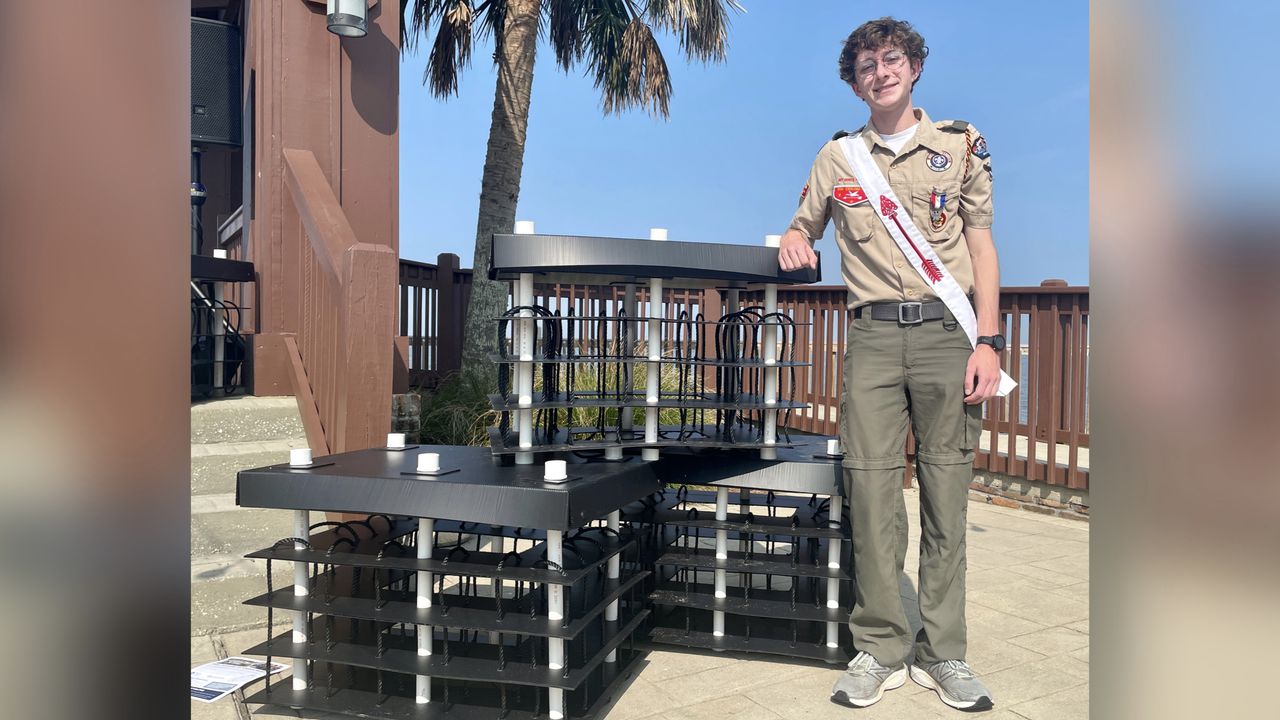Boy Scout raises $52,000 for 175 artificial reefs in Mobile Bay
John Shell fondly recalls going out on the boat with his dad, reeling in fish from Mobile Bay when he was a child.
On a Boy Scout camping trip about five years ago, he noticed something was different while fishing from the bank: they weren’t catching any fish.
The 17-year-old rising senior at St. Paul’s Episcopal School started researching online about dwindling fish populations.
“I wanted to change that because everyone should be able to come down to Mobile or to coastal Alabama, whether they live here or (are a) tourist, and be able to enjoy the amazing experience of catching a fish,” Shell said at a press conference in Point Clear on Tuesday.
In his research, Shell learned about artificial marine habitats. Needing a capstone project to reach the coveted rank of Eagle Scout, he decided to place artificial reefs in the Bay.
Shell said he initially aimed to place 50 reefs, but what happened next was “overwhelmingly successful.”
His project, dubbed Eagle Reef, raised over $52,000 and deployed 175 reefs. This represents 1.5 to 2 billion gallons of water filtered annually, according to George Hunter, economic development manager for Spire Energy, a company that provides natural gas service along the coast.
The manmade objects act as and resemble natural reefs. These include “oil and gas platforms, bridges, lighthouses, and other offshore structures,” according to the National Ocean Service, but they can also be homemade objects that oysters and barnacles can attach to.
Shell purchases the reefs from the Florida company Ocean Habitats. The 2 feet by 2 feet by 3 feet structures include several layers of sturdy plastic, PVC pipes and rope. They’re designed to be tied between four pier pilings underneath a deck. Within six months of installation, the reefs teem with the oysters, barnacles, fish and crabs of Mobile Bay.
“There are many problems in this world: Some we can fix, and some we cannot. The ones we can fix, we should,” Hunter said Tuesday, speaking at a press conference at the Grand Hotel to celebrate Shell’s project. “Sometimes adults can overcomplicate situations. Sometimes we can’t get out of our own way. Sometimes we need a new angle.”
“Now, if a 17-year-old could raise $50,000 in a summer, imagine what the business community could do,” Shell said to the crowd of local elected officials, university administration and business owners.
As Shell prepares to head off to college in a little over a year — he plans to study microbiology and environmental sciences — his project will outlast his time in the Boy Scout troop.
Eagle Reef is partnered with The Partners of Environmental Progress (PEP) and The University of South Alabama (USA). At Tuesday’s press conference, PEP founding member Tom Bramlett announced they aim to deploy 1,000 reefs, which will filter up to 10 billion gallons of water annually and create habitats that will result in habitats for up to 500,000 fish and crabs per year, according to the project.
“Your words were very emotional to me, because I’ve always lived here, and I love this bay, and I love the coastal waters of Alabama,” Bramblett said. “How can we not be challenged by a rising high school senior to step up and actively do the things that are going to improve our water quality?”
